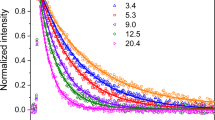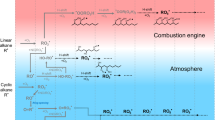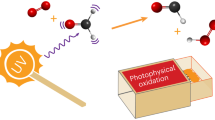Abstract
IT is generally agreed that the oxidation of hydrocarbons occurs by steps such as:  The initial stage of oxidation as depicted by (1) is endothermic, while (2) and (3), and also many subsequent reactions, are exothermic. Experimentally, however, no evidence seems to have been furnished which would demonstrate the endothermic nature of the initial stage of hydrocarbon oxidation. What is well known is that the reactions are exothermic: cool flames readily appear in the early stages of oxidation of numerous hydrocarbons, particularly n-alkanes (excepting methane and ethane), and cause a considerable rise in the temperature of the reacting gases.
The initial stage of oxidation as depicted by (1) is endothermic, while (2) and (3), and also many subsequent reactions, are exothermic. Experimentally, however, no evidence seems to have been furnished which would demonstrate the endothermic nature of the initial stage of hydrocarbon oxidation. What is well known is that the reactions are exothermic: cool flames readily appear in the early stages of oxidation of numerous hydrocarbons, particularly n-alkanes (excepting methane and ethane), and cause a considerable rise in the temperature of the reacting gases.
This is a preview of subscription content, access via your institution
Access options
Subscribe to this journal
Receive 51 print issues and online access
$199.00 per year
only $3.90 per issue
Buy this article
- Purchase on Springer Link
- Instant access to full article PDF
Prices may be subject to local taxes which are calculated during checkout
Similar content being viewed by others
References
Minkoff, G. J., and Salooja, K. C., Fuel (Lond.), 32, 516 (1953).
Author information
Authors and Affiliations
Rights and permissions
About this article
Cite this article
SALOOJA, K. Gas Phase Oxidation of Hydrocarbons: Endothermic Nature of the Initial Stage of Reaction. Nature 183, 602–603 (1959). https://doi.org/10.1038/183602a0
Issue Date:
DOI: https://doi.org/10.1038/183602a0
This article is cited by
Comments
By submitting a comment you agree to abide by our Terms and Community Guidelines. If you find something abusive or that does not comply with our terms or guidelines please flag it as inappropriate.



